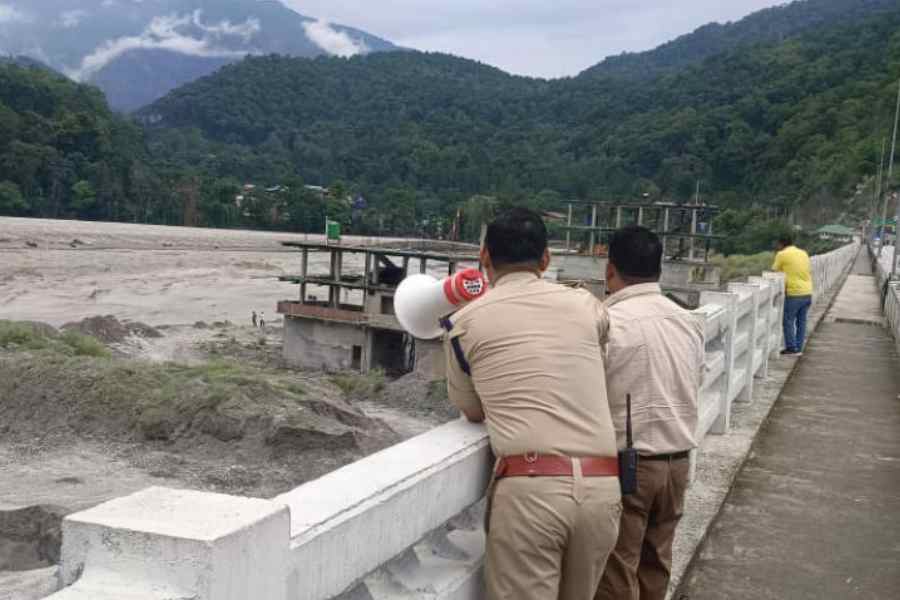North Sikkim received nearly double the usual rainfall over the past fortnight, most of it in the last couple of days, which triggered landslides and swelled the Teesta and some other streams to set off flash floods, weather experts said on Friday.
The natural disaster that has claimed six lives has snapped road connectivity, leaving around 1,200 tourists — including 15 foreign visitors — stranded in the northern district of Mangan for a second day.
The state government said the tourists were safe and there was "no immediate threat of food shortage". It said it was exploring options for evacuation, including "airlifting".
Sikkim has announced a helpline — 76026-73187 — to "provide timely assistance to rural residents during emergencies", an official said.
"It rained around 90 per cent more than normal in Mangan from June 1 to June 14. The southwest monsoon is vigorously active in the region," an official of the India Meteorological Department (IMD) said.
IMD data shows that Mangan, situated along the India-China border, has received 333mm rain during this period against the normal figure of 174.8mm. It has received 240mm rain in the past 48 hours.
Namchi, a district in southern Sikkim, has received 81 per cent excess rainfall this past fortnight.
"Such excess rainfall (in Mangan) has led to this situation. There is a red alert with 70mm to 200mm rain forecast over the next couple of days in Mangan. There will be rain in the rest of the state and neighbouring sub-Himalayan Bengal," the IMD official said.
The Met office has sounded a similar alert for Kalimpong, Jalpaiguri and Alipurduar in Bengal.
The flash floods and landslides that swept away roads and bridges on Wednesday night and Thursday morning have cut off many areas of Mangan, including tourist hotspots like Lachung, from the rest of the country.
“The chief secretary (of Sikkim) has initiated talks with the Centre for possible airlifting of tourists, provided the weather conditions improve. Also, options to evacuate them by road are being explored,” the Sikkim tourism and civil aviation department said in a statement on Friday.
“It is also clarified that only Lachung has been affected… the rest of Sikkim is open and safe for travel.”
Of the foreign tourists, two are from Thailand, three from Nepal, and the remaining 10 from Bangladesh, a source said.
When the Teesta triggered flash floods last October after the glacial South Lhonak Lake suffered an outburst, tourists stranded in Mangan had been airlifted.
On Friday, chief minister P.S. Tamang held a meeting at his residence in Gangtok to assess the situation.
“The calamity has drastically impacted our state, severely damaging properties, disrupting road connectivity, power supply, food supply, and mobile network in multiple areas,” Tamang said in a statement.
“We held the meeting to strategise and coordinate our response efforts to restore normalcy and ensure the safety, and well-being of our residents.”
At the meeting, officials provided briefings on the extent of the damage, including the critical road and bridge disruptions, and updates on immediate relief measures, including the deployment of emergency services and the distribution of essential supplies, sources said.
In Kalimpong, the district administration on Friday allowed the movement of light vehicles along the NH10, the principal highway that connects Kalimpong and Sikkim with the rest of the country.
Restrictions had been imposed on vehicular traffic along the route on Thursday because rain had damaged certain stretches of the road.
“Trucks and other heavy vehicles are, however, still taking the alternative route. In Teesta Bazaar, several families living close to the Teesta riverbank have been shifted,” an official said.











